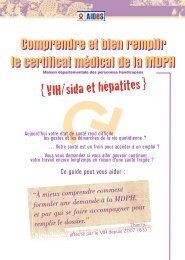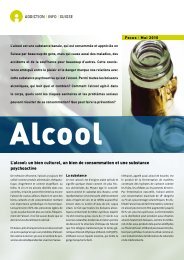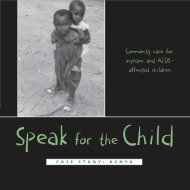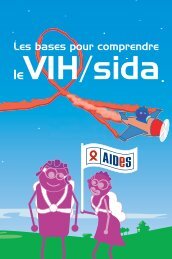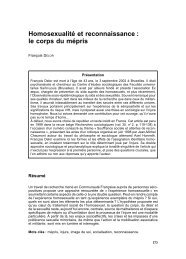Care and support for people living with HIV/AIDS
Care and support for people living with HIV/AIDS
Care and support for people living with HIV/AIDS
You also want an ePaper? Increase the reach of your titles
YUMPU automatically turns print PDFs into web optimized ePapers that Google loves.
Report on the global <strong>HIV</strong>/<strong>AIDS</strong> epidemic – June 2000Be<strong>for</strong>e <strong>AIDS</strong>, about 2% of all children in developing countries were orphans. By1997, the proportion of children <strong>with</strong> one or both parents dead had skyrocketed to7% in many African countries <strong>and</strong> in some cases reached an astounding 11%.In African countries that have had long, severe epidemics, <strong>AIDS</strong> is generatingorphans so quickly that family structures can no longer cope. Traditional safety netsare unravelling as more young adults die of this disease. Families <strong>and</strong> communitiescan barely fend <strong>for</strong> themselves, let alone take care of orphans. Typically, half of all<strong>people</strong> <strong>with</strong> <strong>HIV</strong> become infected be<strong>for</strong>e they turn 25, acquiring <strong>AIDS</strong> <strong>and</strong> dying bythe time they turn 35, leaving behind a generation of children to be raised by theirgr<strong>and</strong>parents or left on their own in child-headed households.Wherever they turn, children who have lost a mother or both parents to <strong>AIDS</strong> facea future even more difficult than that of other orphans. According to a report publishedjointly in 1999 by UNICEF <strong>and</strong> the UN<strong>AIDS</strong> Secretariat, <strong>AIDS</strong> orphans are atgreater risk of malnutrition, illness, abuse <strong>and</strong> sexual exploitation than childrenorphaned by other causes. They must grapple <strong>with</strong> the stigma <strong>and</strong> discrimination sooften associated <strong>with</strong> <strong>AIDS</strong>, which can even deprive them of basic social services<strong>and</strong> education.Although the crisis is enormous <strong>and</strong> its impact devastating, countries <strong>and</strong> communitiesacross Africa are rallying to react to the damage <strong>and</strong> to counter some of its worstimpacts. In Malawi, the Government decided early on to <strong>support</strong> community-basedprogrammes <strong>and</strong> has had a National Orphan <strong>Care</strong> Task Force since 1991. Across thecountry, community-based organizations are setting up child-care centres toimprove the care of children <strong>and</strong> increase their learning opportunities. In Zambia,which has the second largest proportion of <strong>AIDS</strong> orphans in the world after Ug<strong>and</strong>a,nongovernmental organizations are working hard to fill gaps by providing food, clothing<strong>and</strong> school fees to orphans <strong>and</strong> their families. In Zimbabwe, where 7% of all childrenunder 15 are orphaned by <strong>AIDS</strong>, a National Policy on the <strong>Care</strong> <strong>and</strong> Protectionof Orphans has been developed, which advocates that orphans should be placed ininstitutions only as a last resort <strong>and</strong> be cared <strong>for</strong> by the community whenever possible.Ug<strong>and</strong>a Women’s Ef<strong>for</strong>t to Save Orphans (UWESO) was started in 1986 by JanetMuseveni, wife of President Yoweri Museveni, in the aftermath of the country’slengthy civil war, functioning as a relief agency to assist orphans in resettlementcamps <strong>and</strong> return them to their extended families. As the country became increasinglyaffected by the <strong>AIDS</strong> epidemic, UWESO shifted its emphasis to <strong>support</strong> <strong>for</strong><strong>AIDS</strong> orphans; the organization, <strong>with</strong> its 35 branches countrywide, helps fund education<strong>and</strong> training <strong>for</strong> the children <strong>and</strong> runs a micro-finance scheme to help thecaretakers – typically, female relatives of the children – to start up small businesses<strong>and</strong> trading activities.28



